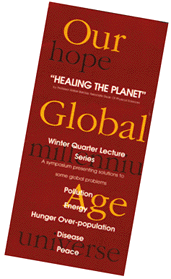
 The University of Chicago Magazine February 1996
The University of Chicago Magazine February 1996

Mandel Hall has seen its share of high-toned and historic lectures. In early December, Saul Bellow took the podium to expound on literature's place in a democratic society. Even a mishap involving a spilt glass of water that soaked Bellow's speech failed to halt the momentum of his delivery, or his audience's rapt attention.
But what if Bellow's audience had known that his water glass contained "enough energy to power Chicago for weeks!" None other than Alistair Barclay made this claim before a Mandel Hall audience in January. As if on cue, the crowd gasped with a mixture of wonder and outrage.
The brochure above informs that Barclay is "associate dean of physical sciences" at the U of C, and the keynote speaker for an important academic symposium--as interpreted by Hollywood.
Director Andrew Davis--whose 1993 hit, The Fugitive, had segments filmed at the University Medical Center--thought Mandel would be the perfect set for a pivotal scene in his latest project. Called Dead Drop, it stars Keanu Reeves and Morgan Freeman, with classics professor and Court Theatre founding director Nicholas Rudall cast in the supporting role of Barclay.
Just as Hollywood interpreted the U of C for the scene--in which Barclay dramatically informs the Mandel crowd of his discovery of an environmentally safe energy source--so the University interpreted Hollywood. A friend who was among about 1,000 students, faculty, staff, and Hyde Park residents herded in as extras for the shoot recounted its many ironies.
"As they were setting up in Mandel, they had us wait about an hour. There was an interesting contrast between this group of freshman girls who were nervously writing Keanu Reeves a love note, and cynical graduate students like myself, who kind of rolled their eyes and studied.
"In fact, some of us were talking about Keanu in pretty deprecating terms. Because his role in the film is that of a U of C physics student--and he's not exactly known for his substantial intellect."
Once on the set, the more jaded extras had more cause to snicker: Over the stage hung a large banner with the words: "Our Global Age: Millenium, Hope, Future."
"Almost immediately," my friend recalls, "several of us noticed that the word `millennium' was incorrectly spelled."
Sizing up his extras' critical temperaments, Davis conceded to the group that this faux symposium may seem a bit silly to authentic academics. Indeed, there was something in Barclay's big speech about "how Mexicans are destroying themselves by eating tortillas, because of the tortilla factories and the waste, that cracked us up," my friend informs me.
But she and her fellow extras were not immune to the allure of celebrity: When Morgan Freeman walked on the set, they rallied an impromptu standing ovation. Keanu Reeves' entrance was also applauded, though the group remained seated.
Reeves shouldn't feel too bad. After all, he gets paid millions for thrillers like Dead Drop. The Mandel extras worked for nothing but the fame.
Florence Shale, PhD'64, surprised us with a call regarding our December/95 story on Sherwood Rowland, SM'51, PhD'52, who was the 25th U of C alumnus to receive a Nobel Prize. Shale kindly pointed out our failure to list her friend and our 26th alumni Nobelist. Esmat Ezz, PhD'64, was among a group of ten who received this year's Peace Prize for work on the Pugwash Conferences on Science and World Affairs.
The group was cited for bringing together "scientists and decision-makers to collaborate across political divides on constructive proposals for reducing the nuclear threat." Ezz, former surgeon general of Egypt, has devoted his retirement years to Pugwash.
A slight deviation in our masthead: "Issue editor" Tim Obermiller is pinch-hitting for Mary Ruth Yoe, currently acting director of the Alumni Association. Just in case you're looking for a name to send those letters to the editor we so enjoy receiving.--T.A.O.